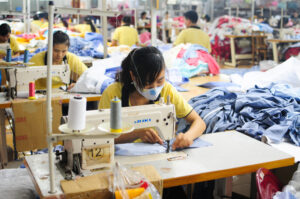Brands including Primark, Next and JD Sports have yet to sign up to a new deal designed to protect garment workers in Bangladesh.
Almost 80 companies including Marks & Spencer, John Lewis, Asos, H&M, Zara’s owner Inditex and New Look have backed the legally binding deal, which replaces one signed by more than 200 international fashion companies after the Rana Plaza factory collapsed in 2013, killing more than 1,100 people.
Primark, which paid out millions of pounds in compensation to victims of Rana Plaza, where one of its suppliers was based, said it intended to sign and was reviewing the legal documents. “We’re pleased that the negotiations for the new accord have now concluded,” it added.
Under the original agreement, the accord on fire and building safety in Bangladesh, brands and factories faced legal action if their health and safety standards were found lacking or if they did not address problems in an agreed time period. More than 38,000 inspections have been carried out since 2013, and almost 200 factories have lost their contracts owing to poor safety standards.
That deal, which was agreed with the international clothing workers’ unions UNI Global and IndustriALL, expired on Tuesday.
Some UK brands only signed up to the new deal, the international accord for health and safety in the garment and textile industry, in the last 24 hours. Negotiations have been lengthy with union leaders expressing concerns that the legally binding element was under threat and that improvements in conditions, wages and safety made since 2013 would be undermined. Some brands also held back because of union demands to extend the agreement into other countries beyond Bangladesh.
Christy Hoffman, general secretary of UNI Global Union, said: “Today marks a significant step forward for workers in the global garment industry. In signing the international accord, brands and retailers shore up their commitment to factory safety in Bangladesh and also agree to establishing badly needed enforceable and transparent health and safety programmes in at least one other garment-producing country.
“We are delighted that so many global retailers and brands have signed up to the international accord and, in doing so, are taking responsibility for garment worker safety in their supply chains. We look forward to welcoming more signatories to the international accord as soon as possible.”
The new agreement, which is managed by the Ready-Made Garments Sustainability Council (RSC), is valid until October 2023. Further brands are expected to sign up over the coming weeks and months.
Companies signing up commit to expanding general health and safety for workers beyond fire and building safety, human rights due diligence along supply chains, and making the same commitment to garment workers in at least one other country.
Signatories have agreed to meet in six months’ time to discuss which countries, with the aim of making changes within two years.
Read more:
UK brands yet to sign accord on Bangladesh garment workers’ safety
